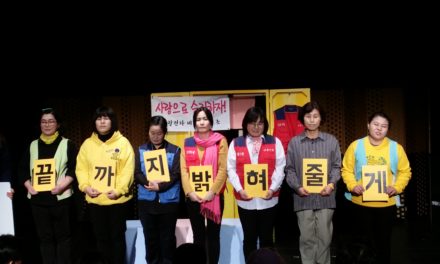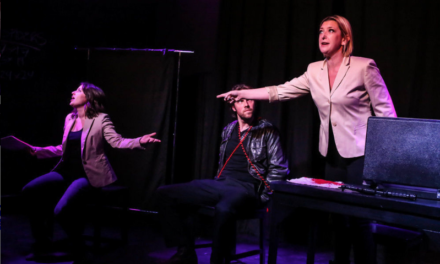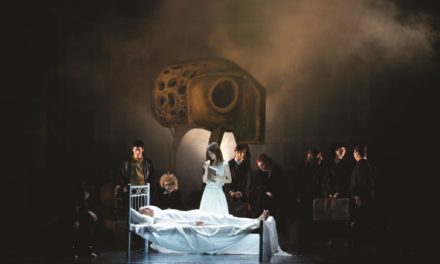The tree of knowledge of good and evil is the symbol for human emotions and desire in the Old Testament. When Adam and Eva were seduced to take the forbidden fruit from the tree, they begin to realize their own egos and desire and individuation were set up. The forbidden fruit has been widely acknowledged to be apple by most of the Western literature and arts. With the translation and interculturalizing of the Western works and theatre in China. Apple and apple tree have been given the identity of love between men and women.
In 2024, National Theatre of China in Beijing showcased an experimental avant-garde theatre work Apple Tree to talk about the tension in the contemporary marriage between a young Chinese couple. Their tension in the marriage was reflected when the wife is suffering from the unexpected miscarriage.
In Chinese traditional culture, giving birth is an inevitable mission of young couple to continue the family as Chinese people used to live in a big clan-type family. This mission was then named as chuanzong jiedai, (continue clan, carry on the next generation) that indicates the young couple would be recognized as irresponsible for the whole clan if they did not give birth or failed to give birth to a child or more. The more children you give birth the better life and virtue the couple could be entitled. When it came to the late 20thcentury PRC, “one child policy” has aroused huge changes on this mission. Now a couple are only allowed to have one child in their whole life. This change did not only demographic structure of China, but also enhance the importance and cautiousness of giving birth to a healthy child and requirements on parenting. The young couple had to take more cautious consideration when parenting. They have to be more prepared before giving birth. They need to get enough money or have a good job; they need to be ready to clear up any past mental trauma before they give birth. They also need to be emotionally stable and mature to parent. These have become the social principles of being good parents in China for the past 40 years.
The wider social contexts gave the Director Feng Lu the inspiration that he may or may not aware of when he produced the play. During my interview with Feng, he mentioned that the play was produced under his personal experience when his wife and him was set up in the deep sorrowness when their first child was died before birth. It was in the sadness for the two of them that he raised the concern about the specific social context of marriage and giving birth.
The play started from the tranquilness with the beautiful non-naturalistic staging with an immersive experience. The audience entered the theatre, hearing birds, seeing a living room space that was embedded in the beautiful garden-like stage. Everything was so relaxed and enjoyable with the staging. The stage was set up as the the creative interpretation of the Eden Garden with the symbol of an arch in the middle of the stage and apples scattered around.
Suddenly the husband came in the living room and showed the sense of nervousness in his chaos of preparing for revesting the hospital, though there was still a suspense among the audience about why the couple need to go to the hospital. Then, the narration was based on the dialogue between the husband and the wife. Through the dialogue, the audience got a play of treasure hunt to find out the reason and got approached to the tension between the couple. The couple both know that their child has probably died in pregnancy which led to their disappointments and sadness. However, each of them wanted to hide their own sadness to protect the other from being lost in the sadness. They pretended to be fine. They said to each other “everything is alright”. However, they are not ok. By hiding and oppressing their sorrowness, they became passively aggressive, they argued, they fight, they uncovered the trauma of each other, they blamed the loss for each other. Eventually they reconciled, they agreed each other in love. The ending of the play was very reflective, in which the audience got three choices, the child did not survive, they got a daughter and grew up to have a conversation with the father, or they got a son and grew up to have a conversation with the mother.
The play is such a transnational one. The director Feng was educated in France when he was young, with established exposure to the French film and theatre. In this play and his previous productions, there are huge amount of Roland’s style of using montage and space changing. In this work, Apple Tree, Feng used the time-traveling in the ending to give three assumptive choices for the audience. He also used the suppositional soliloquy narrative, in which the emotion hidden by each of the couple was explicitly presented through their soliloquy under the spotlight. The characters take this opportunity to tell the audience what they do is different from what they think. They want to hide their sadness to protect their spouse from being lost. This means that Feng uses a trendy French-film narrative to express a very Chinese cultured plot. In Chinese culture, sadness would be kept by themselves while the happiness would be shared. They believe that showing their own fragile would deepen the sorrowness in the marriage, so they often choose to endure the sadness by their own rather than speaking it out. The transnationality as a process is thus carried out with a clear boundary between what is French and what is Chinese. They could be implemented in the same way of narration but could also be used to express a cultured topic from the other culture. Another example of this transnationality is the inculturation of religious theme of Eden garden in the staging and the symbolization of apple and apple tree for giving birth, which was a common theme for most of French Avant Garde theatre. However, the topic of giving birth was narrated in such Chinese way in which it is related to the social issues of contemporary China and contemporary Chinese families. This transnationality means that the play is an integral process in which Chinese and French could not be cleared separated up from each other in the same production.
This post was written by the author in their personal capacity.The opinions expressed in this article are the author’s own and do not reflect the view of The Theatre Times, their staff or collaborators.
This post was written by Xunnan Li.
The views expressed here belong to the author and do not necessarily reflect our views and opinions.


















